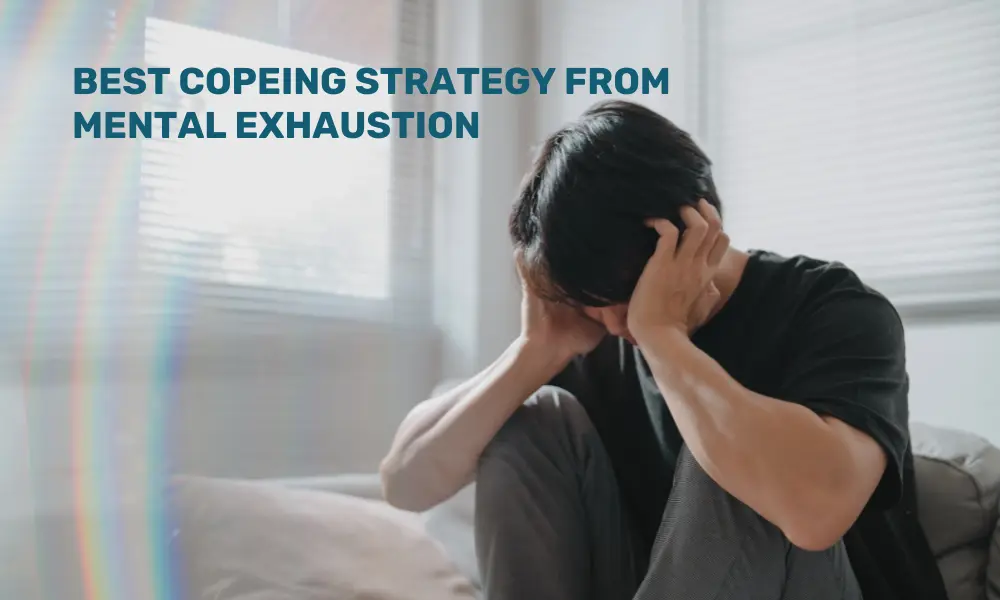Best Coping Strategy from Mental Exhaustion
Mental exhaustion, akin to physical fatigue, arises when the brain is subjected to prolonged periods of intense mental activity or stress without sufficient rest. This condition, often called mental fatigue, can stem from various demanding tasks and life situations.
Unlike physical exhaustion, which manifests through tired muscles and a need for sleep, mental exhaustion primarily impacts emotional and cognitive functioning. Recognizing the signs of mental exhaustion and fatigue is crucial, as this can help one adopt effective coping strategies for maintaining mental well-being.
Symptoms of mental exhaustion
Mental exhaustion typically presents a range of emotional, cognitive, and physical symptoms.
Physical symptoms: Mental exhaustion often affects physical health, causing headaches, stomach issues, muscle pain, and sleep disturbances such as insomnia or chronic fatigue. Changes in appetite and frequent illnesses are also common.
Emotional symptoms: These include persistent feelings of sadness, anxiety, irritability, and hopelessness. Emotional detachment, cynicism, and reduced motivation are common, making finding joy in daily activities challenging.
Behavioral symptoms: A decline in performance at work or school, increased substance use, and social withdrawal are typical behavioral indicators of mental fatigue.
Cognitive symptoms: Mental fatigue impairs concentration, memory, and decision-making skills. Tasks that once seemed manageable may become overwhelming, leading to procrastination and decreased productivity.
Causes of mental exhaustion
Several factors that can contribute to mental exhaustion may include:
-
Lack of support: Insufficient emotional and social support exacerbates feeling overwhelmed.
-
Overwhelming responsibilities: Balancing work, caregiving, and other responsibilities without adequate rest can lead to burnout.
-
High-pressure jobs: Occupations that demand long hours and high cognitive load can drain mental resources.
-
Chronic stress: Ongoing stress from financial issues, job dissatisfaction, or personal loss can elevate cortisol levels, impacting mental and physical health.
Coping strategies
Addressing mental exhaustion involves a combination of lifestyle changes and coping mechanisms:
Adequate sleep: Prioritizing sleep is crucial. One must have a calming bedtime routine and aim for 7-8 hours of undisturbed sleep to allow the brain to rest and recover.
Taking breaks: Short breaks during prolonged work can help recharge mental energy. Techniques like the Pomodoro technique, which involves 25-minute work intervals followed by a 5-minute break, can be effective.
Exercise: Engaging in moderate physical activities, such as brisk walking or yoga, boosts mood and energy. Exercise enhances emotional resilience and helps manage stress.
Relaxation techniques: Practice relaxation techniques like mindfulness, meditation, progressive muscle relaxation, and deep breathing exercises to reduce stress and promote mental calm.
Balanced nutrition: Maintain a healthy diet and stay hydrated to support overall well-being. Proper nutrition can alleviate some physical symptoms of mental fatigue.
Social support: Connecting with a few friends and family provides emotional support and helps mitigate feelings of isolation. Sharing concerns with loved ones can offer relief and practical solutions.
Professional help: When mental exhaustion persists, seeking help from a mental health professional can be useful. Therapy can provide coping strategies, and in some cases, doctors may suggest medication to manage symptoms of depression or anxiety.
Prevention tips
To prevent mental exhaustion, incorporate the following habits into your routine:
-
Regular time off: Schedule vacations or mental health days to rest and rejuvenate.
-
Self-care: Engage in activities that bring joy and relaxation. Self-care practices are essential for mental health.
-
Set boundaries: Learn to avoid additional responsibilities that could lead to overload.
-
Stay connected: Maintain a strong support network and communicate regularly with loved ones.





